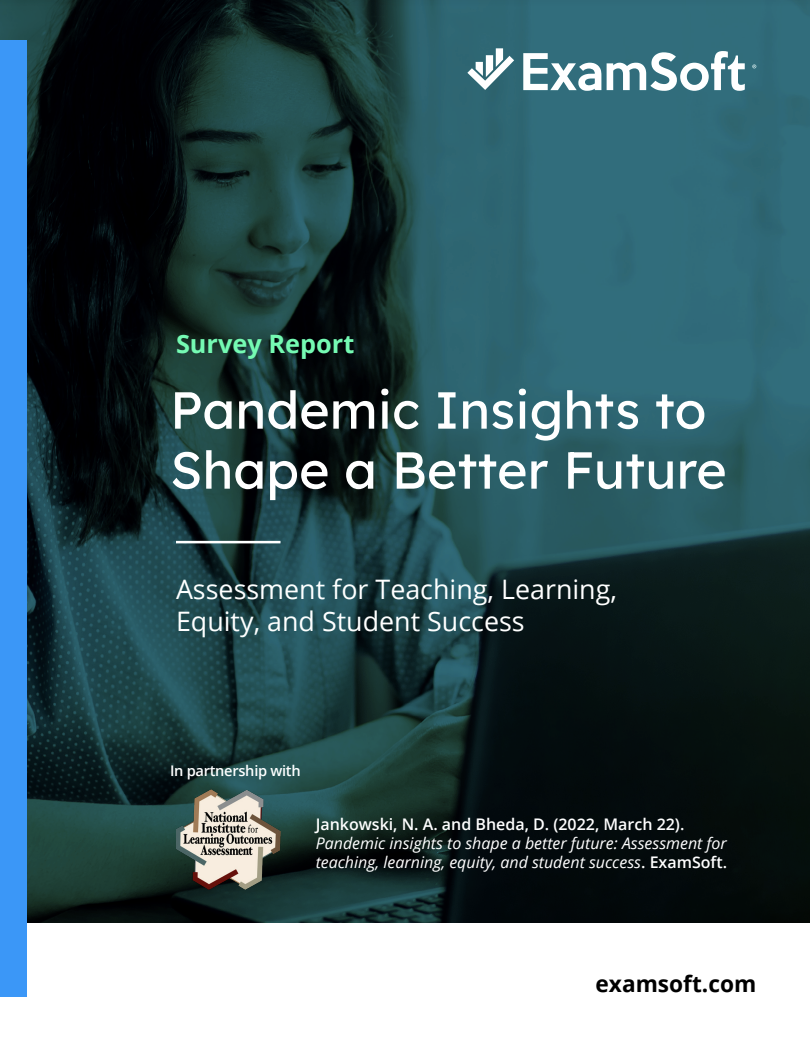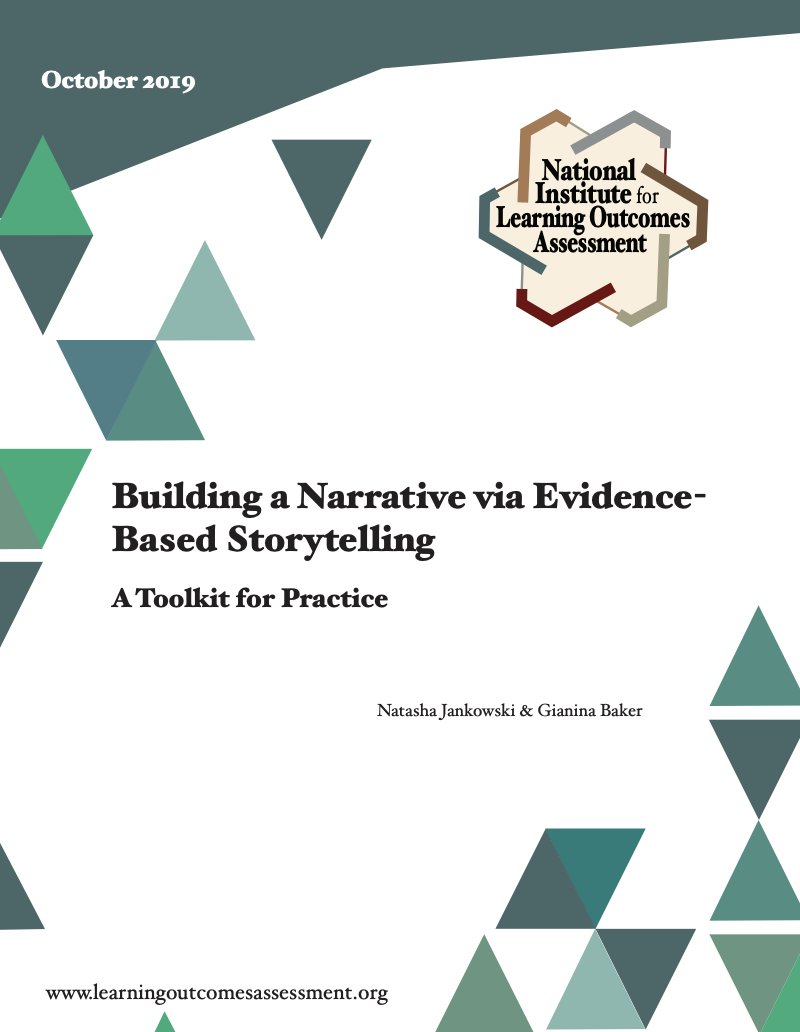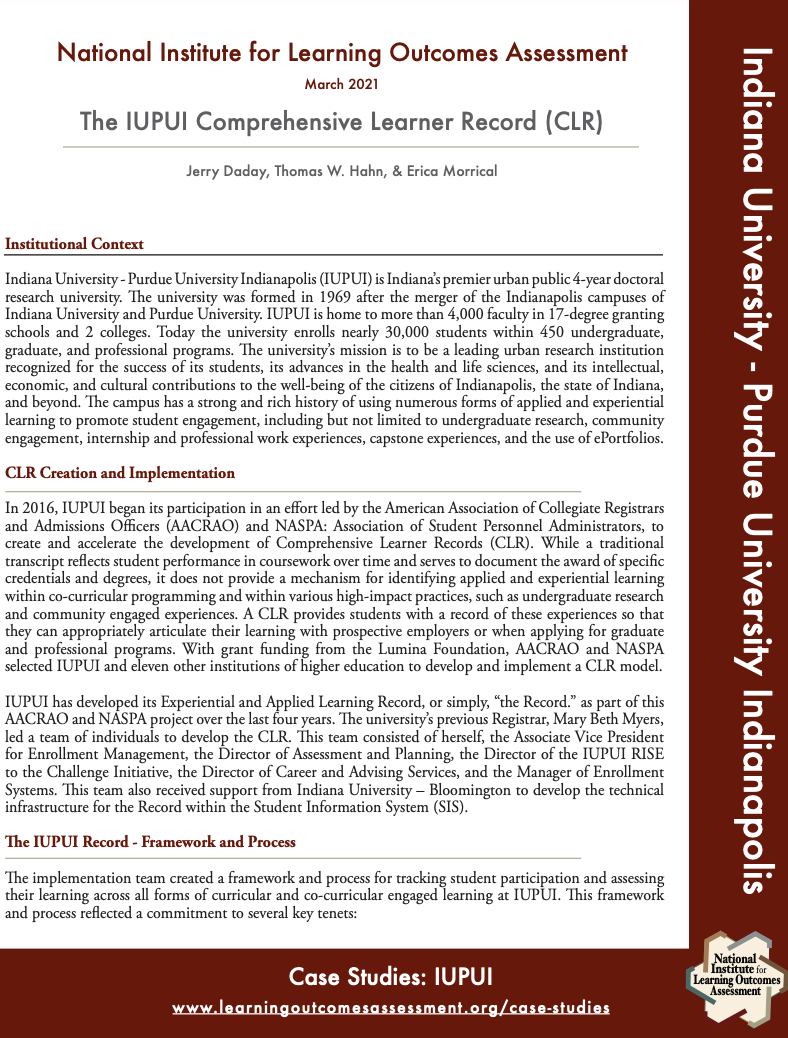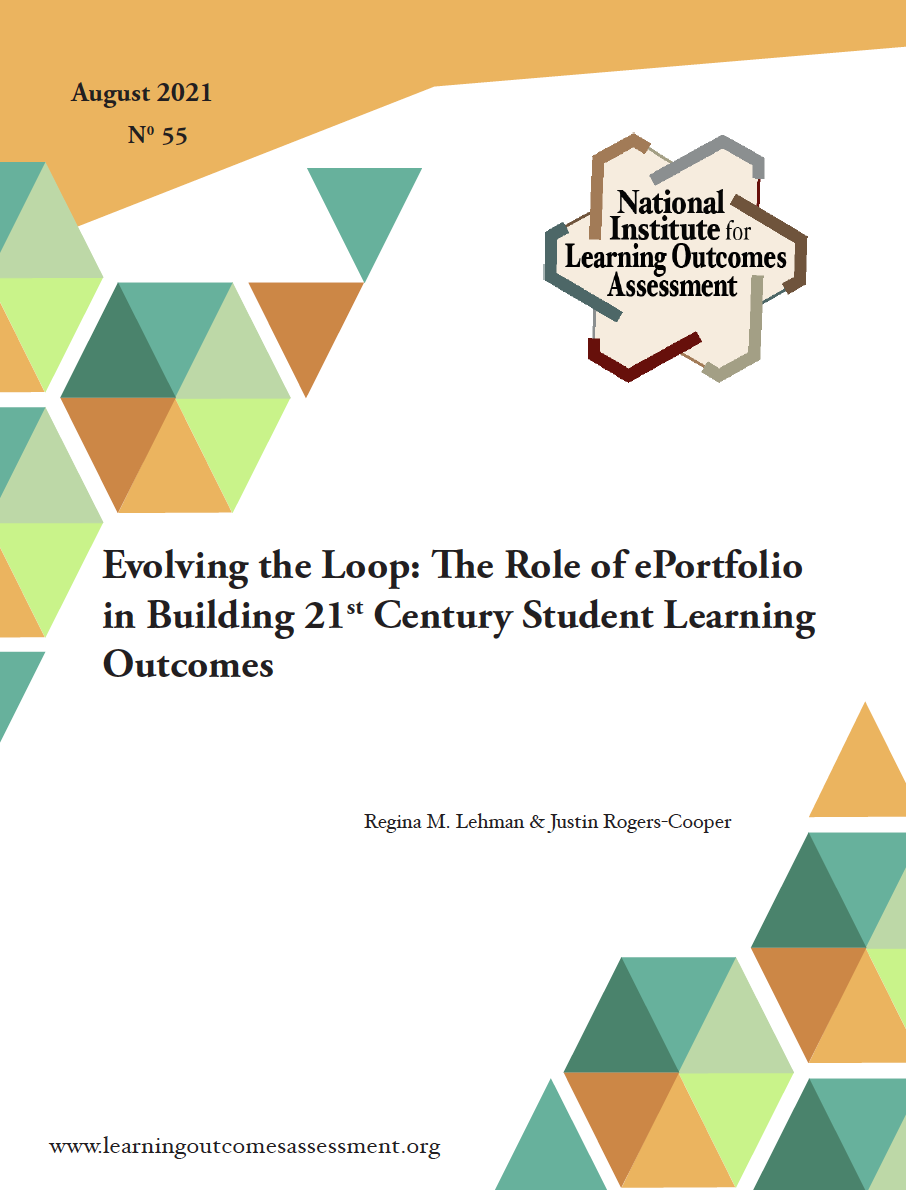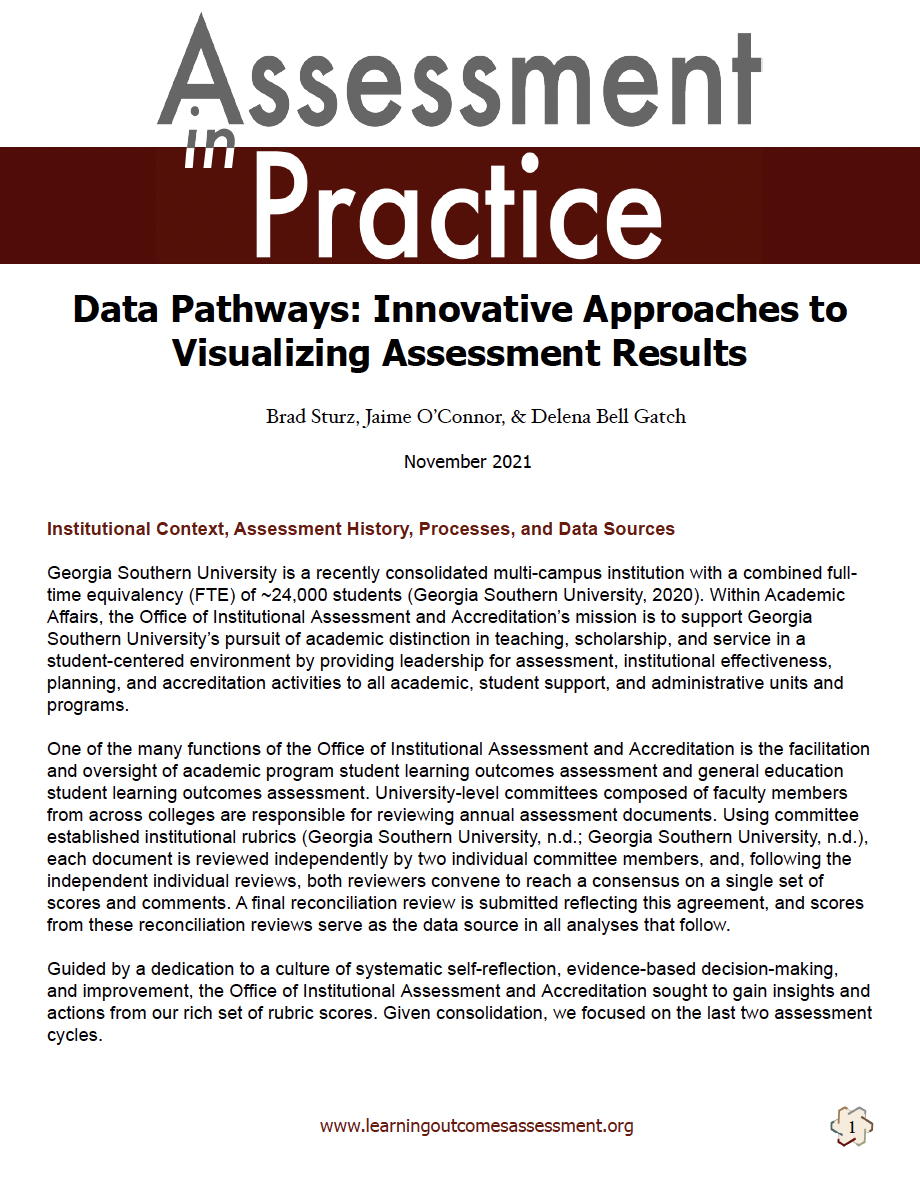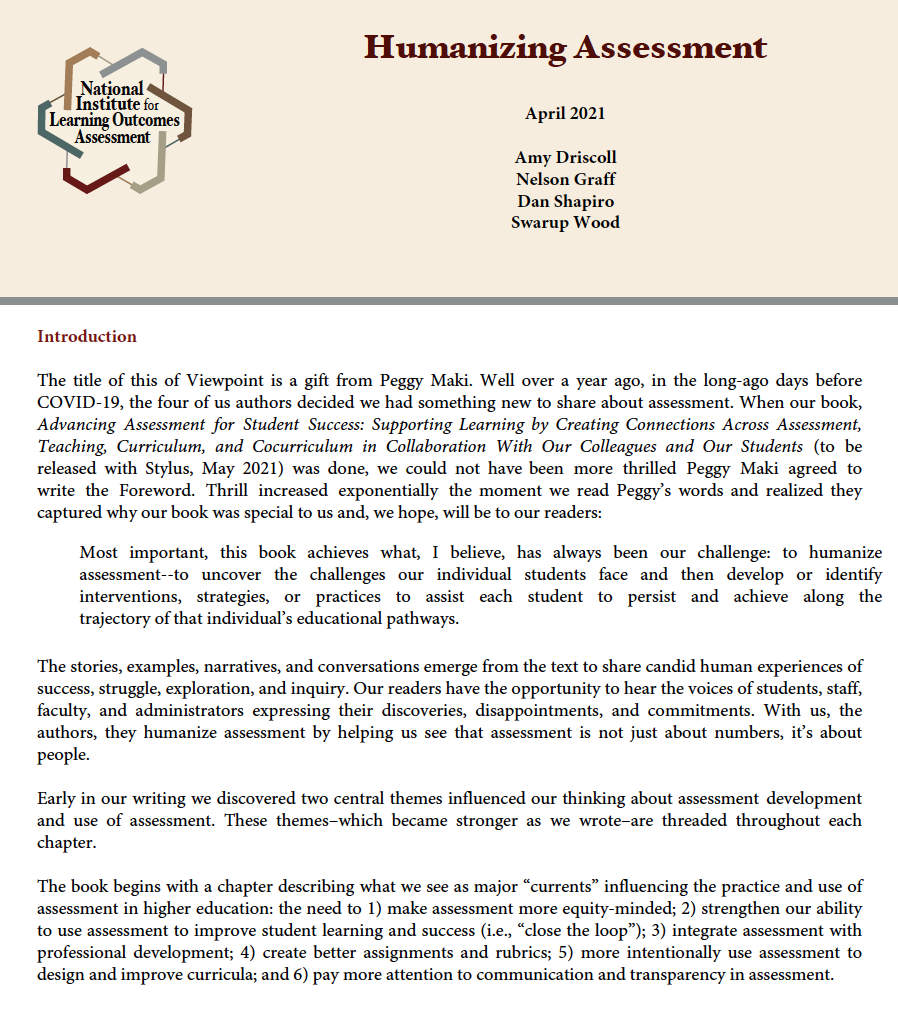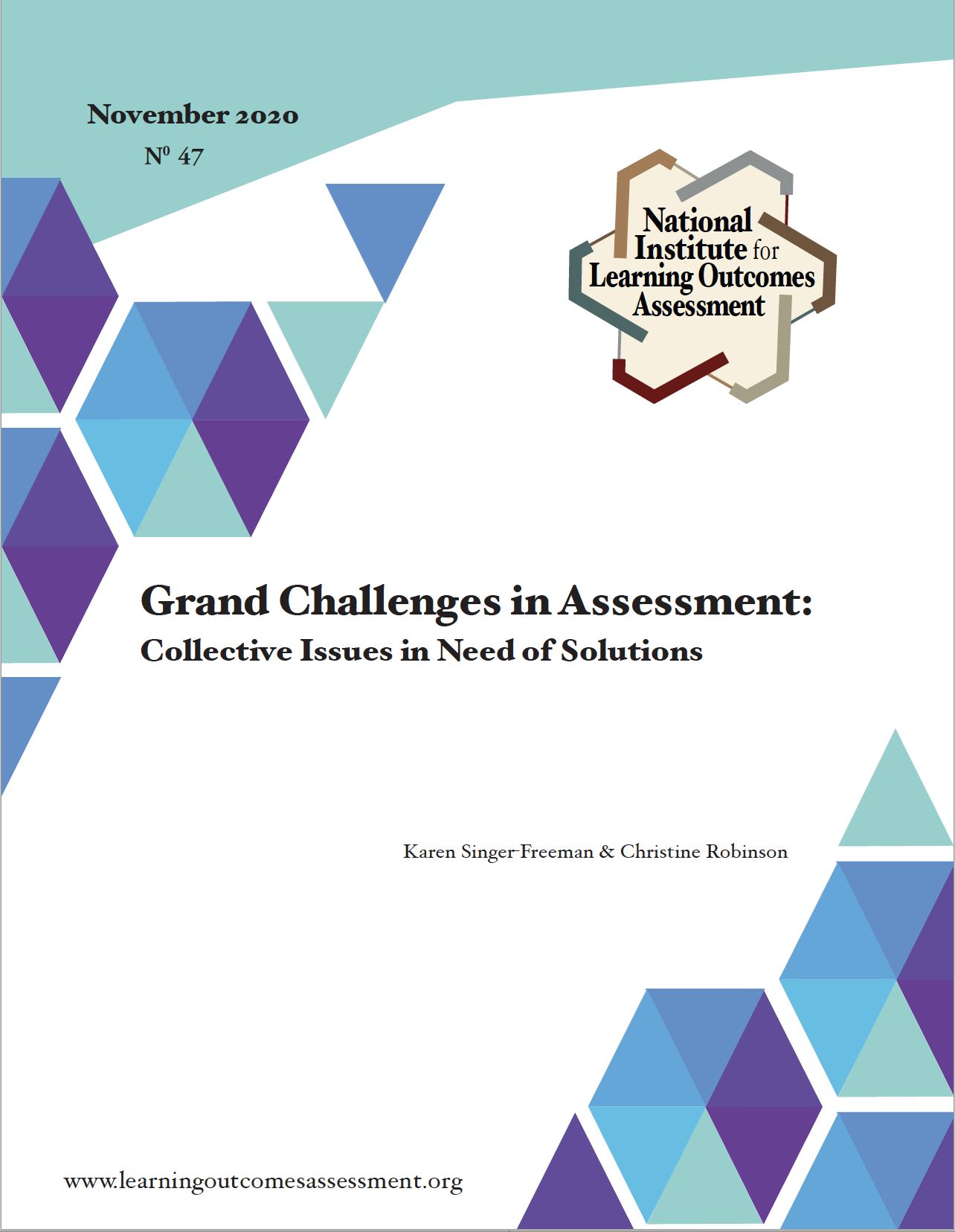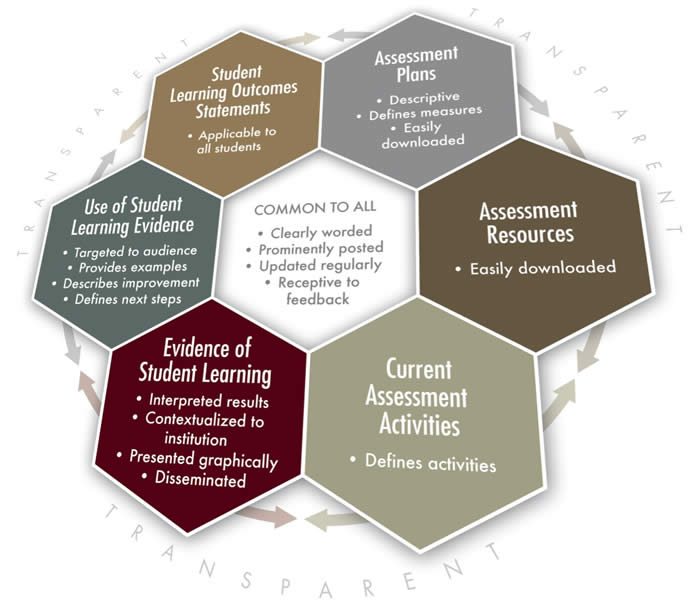Discover, Assess, Distribute.
The National Institute for Learning Outcomes Assessment makes learning outcomes visible and useful to the public.
Antiracist Resources for Teaching, Learning, and Assessment
The NILOA Team compiled a list of curated resources to assist in your journey in antiracist teaching, learning, and assessment of student learning here. (Archived as of December 2022)
Making the Move to Online Courses Resources to Inform Teaching and Learning
The NILOA Team has compiled a resource list to assist the field when academic rapidly moved to online courses to serve students. (Archived as of December 2022)
New Resources
New Report
In partnership with NILOA, Dr. Natasha Jankowski, former executive director of the National Institute for Learning Outcomes Assessment (NILOA) and Dr. Divya Bheda of ExamSoft Worldwide LLC, explored what could be learned from the various shifts and changes to assessment-related processes and practices undertaken in response to COVID-19 in order to inform the future of assessment. In this report, Drs. Jankowski and Bheda discuss findings from a recent survey of higher education faculty, staff, administrators, and students who shared their perspectives and advice working to ensure student success and equity by improving curricula, assessments, teaching, and learning. Read more…
Occasional Paper
Evidence-Based Storytelling in Assessment
In this highly anticipated occasional paper, Natasha Jankowski helps conceptualize what is meant by Evidence-Based Storytelling (EBST)—an approach used at NILOA to refine and encourage evidence-based stories in assessment. According to Jankowski, two purposes are served within this paper “to re-examine what is meant by use of assessment results and to unpack evidence-based storytelling and its connection to assessment.” Here at NILOA we’ve done tons of workshops, presentations, webinars on EBST and hope that when you read this paper, you’ll be reminded of such and have been working on your institutional assessment stories in the meantime. Read more.
New Case Study
Indiana University Purdue University Indianapolis: The IUPUI Comprehensive Learner Record (CLR)
Jerry Daday, Thomas W. Hahn, & Erica Morrical
Indiana University Purdue University Indianapolis (IUPUI) was invited to write a case study because of its strong and rich history of using numerous forms of applied and experiential learning to promote student engagement along with its ongoing Comprehensive Learner Record (CLR) work. Read more…
Occasional Paper No. 55
Evolving the Loop: The Role of ePortfolio in Building 21st Century Student Learning Outcomes
Regina M. Lehman and Justin Rogers-Cooper
In our 55th occasional paper, Regina M. Lehman and Justin Rogers-Cooper explore the use of ePortfolios in advancing general education outcomes assessment. By highlighting the recent redesign of its college’s learning outcomes assessment process, also internally known as “Evolving the Loop”, LaGuardia Community College is using its assessment approach centering ePortfolios to support 21st century student learning outcomes. Read more…
New Assessment in Practice
Data Pathways: Innovative Approaches to Visualizing Assessment Results
Brad Sturz, Jaime O’Connor, & Delena Bell Gatch
In this Assessment in Practice, Brad Sturz, Jaime O’Connor, and Delena Bell Gatch of Georgia Southern University’s Office of Institutional Assessment and Accreditation, discuss how they use heat maps to gain actionable insights about their assessment process. Read more…
New Viewpoint
Amy Driscoll, Nelson Graff, Dan Shapiro, & Swarup Wood
This Viewpoint highlights salient points of their upcoming book, Advancing Assessment for Student Success: Supporting Learning by Creating Connections Across Assessment, Teaching, Curriculum, and Co-curriculum in Collaboration With Our Colleagues and Our Students, to be released May 2021. Read more…
Occasional Paper 47
Grand Challenges in Assessment: Collective Issues in Need of Solutions
This paper shares ten grand challenges identified through an examination of the assessment literature and a national survey. To Resource Occasional Paper read more about how the Grand Challenges were identified, please the recently released Research and Practice in Assessment article. Each of the grand challenges are described, of which four were identified as of greatest concern to the assessment community. Those four are being addressed by the Grand Challenges in Assessment Project for possible collective solutions.
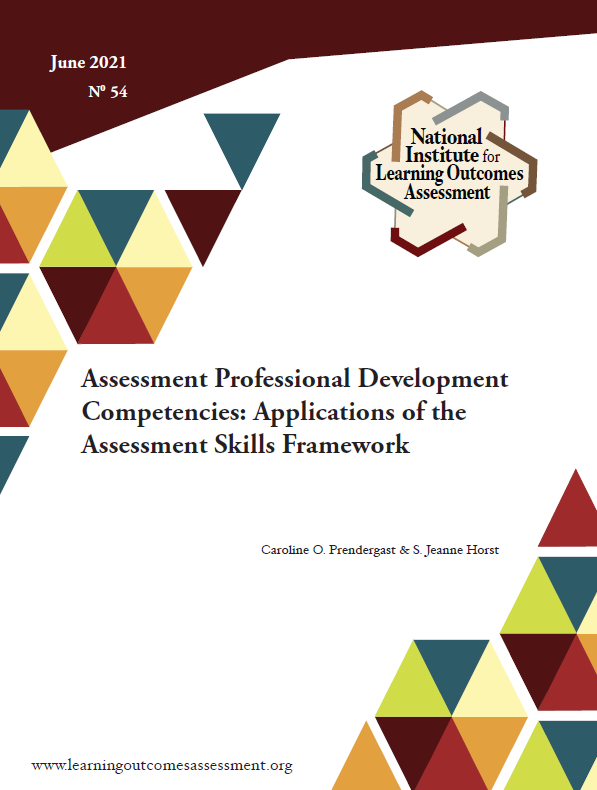
Occasional Paper
Assessment Professional Development Competencies: Applications of the Assessment Skills Framework
Caroline O. Prendergast & S. Jeanne Horst
In this 54th Occasional Paper, Caroline Prendergast and Jeanne Horst present a set of learning objectives, or competencies, for assessment professionals as well as the potential benefits of such work to the field of assessment. Read more…
NILOA Webinar Series
Beyond the Looking Glass:
Tenets of Meaningful Transparency
April 30, 2020
In the final episode of NILOA’s six-part webinar series, Natasha Jankowski, Ruth Slotnick, and Christina Ouellette discuss the role of transparency in student learning (view presentation slides). This includes communication about programmatic design, and the processes and practices at institutions working to convey information of student learning in a clear and coherent manner to different audience(s). The importance of transparency to students and student voice in the process are explored through the example of the transparency project at Bridgewater State University. The webinar concludes with institutional strategies and considerations for transparency in a time of Covid-19. We encourage you to participate in the BSU National Learning Outcomes Transparency survey! We also invite you continue the conversation on social media using the tags #NILOAwebinar, #AssessmentBook, and #AssessmentMusic.
The Evidence-Based Storytelling Toolkit:
Using Assessment Data to Write
Your Learning Narrative
April 23, 2020
Natasha Jankowski, Brad Mello, and Joe Levy provide resources on how to think about and plan for telling a story of learning to specific target audience (view presentation slides). Presenters will provide institutional examples of evidence-based storytelling, as well as guidance on communicating in a time of crisis and tips on messaging assessment efforts to faculty and staff. A new resource from NILOA, Planning for Effective Communication of Assessment: A Toolkit for Practice, was also introduced during the webinar. We invite you continue the conversation on social media using the tags #NILOAwebinar, #AssessmentBook, and #AssessmentMusic. NILOA will host the final webinar of this series April 30, 2020 at 3pm EST.
Outcomes, Alignment and Mapping, Oh My!:
Curriculum Mapping as Educational Design
April 16, 2020
Natasha Jankowski, Dan McInerney, and Errin Heyman present considerations for planning ahead to the summer and fall semester for supporting and advancing learning, especially in light of any learning outcomes that may need to be re-emphasized for returning students within programs. Presenters discussed alignment, levels of mapping, what is feasible now, and where to place our attention as we plan for the future (view presentation slides). NILOA has developed a guiding document for Program Planning in a Time of COVID-19. We encourage you continue the conversation on social media using the hashtags #NILOAwebinar, #AssessmentBook, and #AssessmentMusic. NILOA will continue to host weekly webinars every Thursday at 3:00pm EST through the end of April.
Assignment Design: Charrettes to Build Community in a Time of Physical Distance
April 9, 2020
NILOA will host weekly webinars every Thursday at 3:00pm EST through the end of April. This recording is of the 3rd webinar in the series, presented by Natasha Jankowski, NILOA Executive Director, Pat Hutchings, NILOA Senior Scholar, Tami Eggleston, McKendree University, and Shontell Stanford, Morehouse School of Medicine. The webinar discusses best practices for designing assignments for online learning, including tips for maintaining equity, quality, and applicability (view presentation slides). NILOA also developed a guiding document to conduct Assignment Charrettes in a Time of COVID-19. We encourage you continue the conversation on social media using the hashtags #NILOAwebinar, #AssessmentBook, and #AssessmentMusic.
Second Community Check-in and Updates
April 2, 2020
NILOA will host weekly webinars every Thursday at 3:00pm EST through the end of April. This recording is of the 2nd webinar from April 2, 2020, led by Dr. Natasha Jankowski, NILOA Executive Director. She discusses faculty evaluations, student surveys, messaging assessment reports, and assessing online in the time of COVID19 (view presentation slides). A new NILOA Viewpoint, discusses some of the issues that should be considered in making changes to how we grade students and using pass/fail. We encourage you continue the conversation on social media using the hashtags #NILOAwebinar, #AssessmentBook, and #AssessmentMusic. More information on the webinar series.
First Community Check-in and Updates
March 26, 2020
NILOA will host weekly webinars every Thursday at 3:00pm EST through the end of April. This recording is of the first webinar from March 26, 2020, led by Dr. Natasha Jankowski, NILOA Executive Director. She introduces a handful of resources, as well as advice, to help the field of assessment, and higher education writ large, to navigate the current transition to online as the field responds to the COVID19 pandemic (see presentation slides). The webinar focuses on providing a space for people to come together and decompress, share concerns, and experiences. We encourage you continue the conversation on social media using the hashtags #NILOAwebinar and #AssessmentMusic. More information on the webinar series.
New to Assessment?
Assignment Library
Browse our interactive, online library of high-quality, peer-reviewed assignments.
Immerse yourself in a lively casino ambiance with the mega wheel live casino, bringing the authentic casino feel right to your screen. The dynamic game offers an exciting blend of entertainment and winning opportunities, making every spin a unique adventure.

